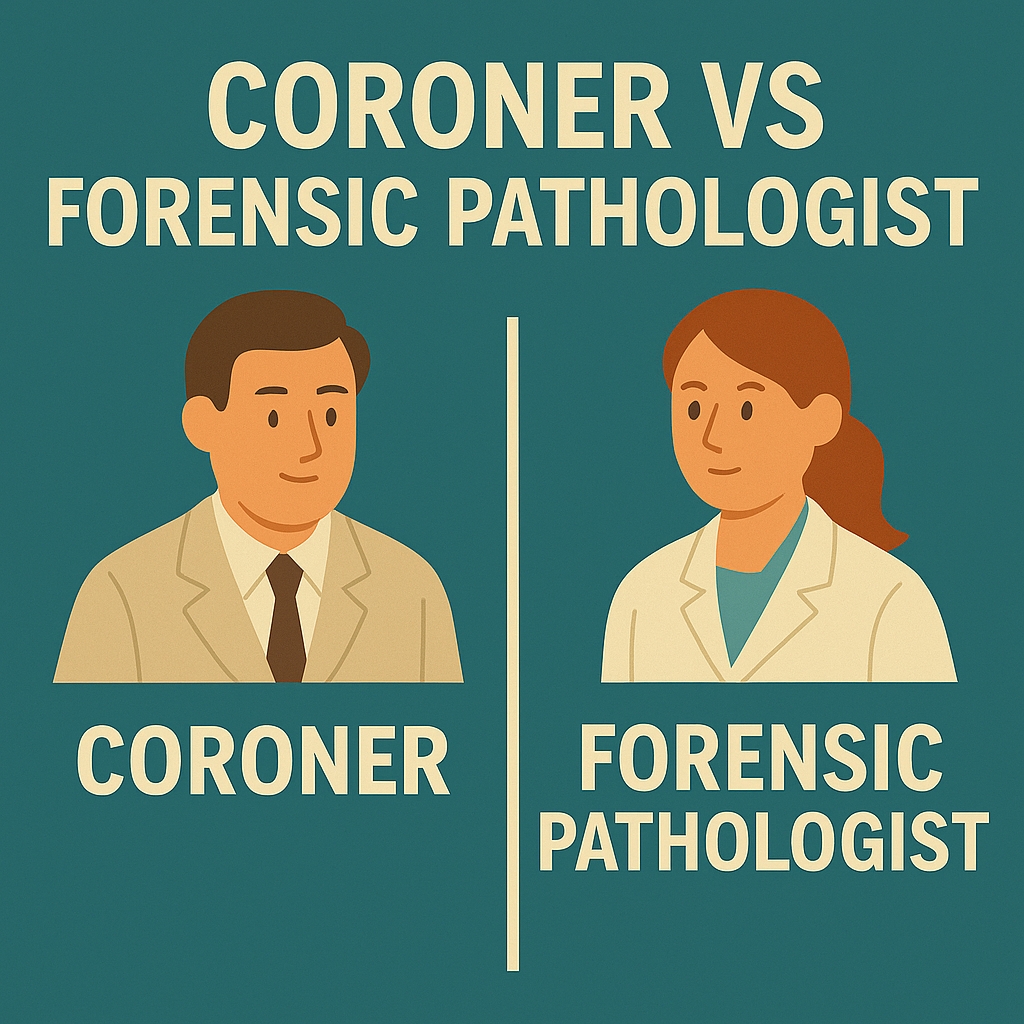If you’ve ever watched a crime drama, you’ve probably heard the terms coroner and forensic pathologist used interchangeably. In real life, though, these are two very different roles with distinct responsibilities, qualifications, and approaches to investigating death.
Whether you’re curious about careers in forensic science or just want to understand who does what when someone dies, this article breaks down the key differences between coroners and forensic pathologists.
1. One May Be Elected, the Other Is Always a Doctor
The most fundamental difference lies in how the roles are filled:
-
Coroners are often elected officials. In many counties across the United States, the position requires only a high school diploma or GED. Some areas may prefer or require a background in criminal justice, public health, or related fields, but formal medical training is not always necessary.
-
Forensic pathologists are licensed medical doctors. They must complete medical school, a pathology residency, and a fellowship in forensic pathology. Their work is highly specialized and deeply rooted in both clinical medicine and legal investigation.
2. Coroners Oversee the Process, Pathologists Perform the Autopsy
Coroners are responsible for overseeing death investigations. They determine whether a death needs further inquiry, request autopsies, review reports, sign death certificates, and coordinate with law enforcement and public health officials. Their role is administrative, legal, and investigatory.
Forensic pathologists do the hands-on work. They examine the body, conduct the autopsy, collect tissue samples, and analyze evidence to determine the exact cause and manner of death. Their findings are often used in criminal trials or civil cases.
3. Jurisdiction Matters A Lot
Some regions use a coroner system, others use a medical examiner system, and some use both.
-
Coroner systems are more common in rural or less populated areas. They may rely on contracted pathologists to perform autopsies when needed.
-
Medical examiner systems are typically found in larger, urban jurisdictions. In these areas, the forensic pathologist is usually also the medical examiner, and the office operates under a centralized, professional model.
The job title and responsibilities you’ll encounter depend heavily on where the death occurred.
4. Education Paths Are Drastically Different
If you’re thinking about these as career options, the training timeline is a major factor.
-
To become a coroner, requirements vary. Some jurisdictions elect coroners from the general public, while others require certification in death investigation within a few months of taking office. Many coroners have experience in law enforcement, emergency response, nursing, or public administration.
-
To become a forensic pathologist, expect 11 to 14 years of education and training. This includes an undergraduate degree, four years of medical school, a pathology residency, and a forensic pathology fellowship. You’ll also need to pass multiple board exams.
5. Coroners May or May Not Visit the Scene
In some jurisdictions, coroners respond to the scene of death, especially if it is sudden, unexpected, or unattended. They may interview witnesses, examine the body for visible signs of trauma, and decide whether an autopsy is warranted.
Forensic pathologists usually examine the body in a clinical setting after it has been transported to a morgue or lab. Their analysis is highly detailed and includes internal examination, toxicology, and microscopic evaluation.
6. They Work Together, Not Separately
Despite the confusion in popular media, coroners and forensic pathologists are not competitors. In fact, they often work closely together.
-
The coroner decides that a death needs further examination and requests an autopsy.
-
The forensic pathologist performs the autopsy and reports findings.
-
The coroner then uses this information, along with police reports, medical history, and other evidence, to finalize the official cause and manner of death.
It is a partnership built on communication, trust, and shared responsibility for accuracy.
7. Both Play a Role in the Justice System
Coroners and forensic pathologists often provide testimony in court, particularly in criminal cases where the cause or timing of death is in question. Their findings can influence charges, convictions, and public health policy.
Forensic pathologists typically testify to the medical findings and what physically caused the death. Coroners may testify about investigative steps, scene observations, or administrative documentation.
8. Pay and Work Environment Can Vary Widely
-
Coroners may be salaried government employees, part-time contractors, or elected officials with a stipend. Compensation varies based on location, population size, and whether the role is full-time.
-
Forensic pathologists are highly trained medical specialists. They are usually well-compensated and may work in state-run medical examiner offices, hospitals, or academic institutions.
Both roles involve emotionally intense work and may require availability outside of normal business hours. Death does not follow a schedule.
Which One Should You Pursue?
If you’re drawn to public service, investigative work, and helping families through some of their hardest moments, but do not want to spend over a decade in school, becoming a coroner might be the right path for you.
If you love biology, medicine, and solving complex medical puzzles, and you are willing to commit to a long and rigorous education, then forensic pathology could be your calling.
Both roles serve the living by honoring the dead, helping families find closure, supporting the legal system, and protecting public health.
If you have feedback, questions, or ideas for future articles or Information Hubs, please contact us. Your insights help us create valuable content.


